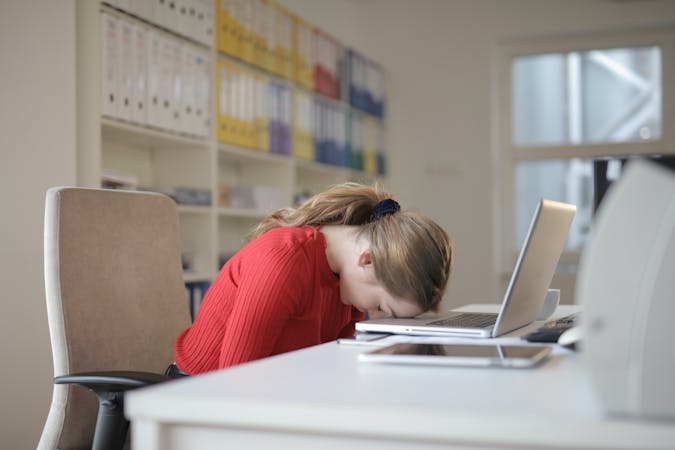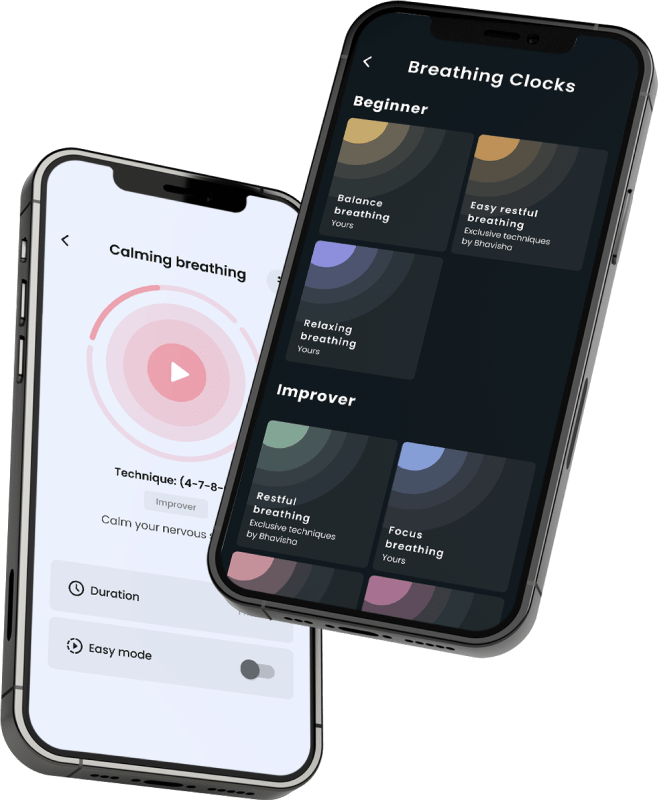Tired at Work but Not at Home? It Can Be a Sign of Work Fatigue.

Fatigue in general can cause a variety of health and lifestyle problems. However, feeling fatigued at work can endanger a person´s livelihood and sometimes even their co-workers'.
It is also, unfortunately, very common. A survey conducted by the American National Safety Council revealed that two-thirds of all workers in the US experience workplace fatigue. Additionally, research shows that about 13% of workplace injuries happen due to poor quality sleep.
Why Does Work Make Me So Tired?
Some people report they only feel sleepy whilst at work, which raises the question of whether their work or office environment is creating a psychosomatic dip in energy levels. Some people who experience prolonged stress at work may experience fatigue as a result of burnout.
Other possibilities are that work patterns such as long hours or shift work stop a person from getting proper rest. Poor sleep habits can impact motivation and focus. Unfortunately, a power nap at lunchtime cannot substitute a good night's sleep. Some people get less sleep during the week due to late nights and early mornings, which can make them feel irritable and less confident in their role.
Another factor may be a lack of interest in repetitive tasks or feeling mismatched to a particular role. Lack of motivation can lead to lower energy levels. A fatigued and unmotivated worker is much less productive as well. A study of boredom at work conducted in Finland found that bored workers were more likely to switch jobs quicker, retire earlier, have lower self-rated health, higher stress levels, and perform worse overall.
One more reason we may feel fatigued at work is a lack of regular physical activity during a busy week. Many of us do not have the time to maintain a healthy lifestyle when working full-time hours, which can lead to a feeling of sluggishness that affects the brain as well as the body.
Why Do I Only Feel Tired at Work?
When a person feels fatigued at work but brightens up afterwards, this is often due to an accumulation of factors. Some of those factors can be part of the working environment, such as a hot, dark, or poorly ventilated room.
Sometimes, our lifestyle is to blame. For example, if we are too busy to keep up with healthy habits during the workweek, we can end up losing focus and motivation when we need it most.
Whatever the causes, if you perk up after your shift, the likelihood is that the work itself isn't draining you; more likely, a combination of environmental and lifestyle factors at work and home are creating this dip.
What Is Workplace Fatigue?
Fatigue has been broadly described as “a feeling of weariness, tiredness or lack of energy”. In workplace settings, it is commonly associated with nonstandard schedules, such as night shift work and extended work hours, which disrupt or shorten sleep. Fatigue can also be associated with other workplace factors such as stress, physically or mentally demanding tasks, or working in hot environments. It can stem from a number of different factors and its effects extend beyond sleepiness. Fatigue can slow down reaction times, reduce attention or concentration, limit short-term memory and impair judgement.
Certain professions are somewhat safeguarded against work fatigue by US law. This is because of the responsibility and potential hazards related to that role. Such professionals include nurses, pilots, and large vehicle drivers.
However, most other professions are not regulated regarding feeling fatigued or potential sleep loss. For this reason, there can be many complications arising from feeling tired at work.
Some of the physical effects of fatigue include dry eyes, muscle weakness, and in some cases, more serious health issues.
Psychologically, there can be an impairment of memory, concentration, reaction time, and communication.
There is also an increased likelihood of risk-taking behaviours, which can create a hazardous work environment. The prospects for employers are similarly jeopardised as absenteeism increases, along with errors in judgement while on the job.
Difference between Tiredness and Work Fatigue
Tiredness and fatigue have similar symptoms but with different causes and treatments. Webmd describes tiredness as a medically "normal" occurrence. They report that tiredness is an expected feeling after an extensive activity or at the end of a day. Fatigue, however, is described as a daily experience of low energy levels that is not relieved by sleep.
Therefore, fatigue is a much more serious experience that can be a sign of extreme stress or certain health conditions. Feeling tired at work can be a result of a one-off occurrence such as not getting enough sleep. If the feeling is recurrent and does not improve after getting enough rest, it is more likely to be caused by fatigue.
How Do You Deal with Being Tired at Work?
There are some quick fixes for improving energy levels at work if you're hoping to be more productive.
- Be sure to get plenty of fresh air in the room or take a quick break outside. Improved air quality has a positive impact on the brain.
- Allow your brain some resting time in between tasks. Taking breaks can improve overall efficacy compared with forcing yourself to plough through all your tasks at once.
- Get some light exercise throughout the day. For example, take a walk on your lunch break. This will improve blood flow to the brain and improve focus.
How Can I Stop Being Tired at Work?
Feeling tired regularly often indicates there are changes needed in our daily life. These could be small changes, such as getting more exercise instead of watching TV in the evening. However, some larger changes may be needed if fatigue is common. Some changes could be:
- If you work irregular shifts, try speaking to your boss about getting some more consistency in your hours.
- Ensure you eat healthy food during weekdays, even if it means preparing meals in advance.
- If your working hours are exceeding a healthy amount or impacting your well being, be sure to get some respite. This could be trying to reduce a heavy workload, taking more vacation days, or even treating yourself to more restaurant food to reduce chores at home.
- With remote work, be sure to designate a space specifically for working, away from resting spaces. This could mean getting a folding screen to separate the room or putting a desk in a corner to face away from the rest of the home space.
- Be sure to check in on your overall health (including mental health.) If you have poor circulation, a desk job will undoubtedly make you drowsy. If you have anxiety, a busy work environment may cause you to "switch off " to avoid office politics.
- Again, exercise can help greatly with most cases. Even if you only spend ten minutes at lunch doing stretches, it can help to regulate the nervous system, improve blood flow, provide a mental break from stressful environments, and improve overall self-esteem.
- Arguably the most important factor to take note of is whether you are getting enough sleep on a work night. Not sleeping enough can greatly impact daily life, making you want to nap during important work hours.
Frequently Asked Questions
Is Work Fatigue a Workplace Issue?
Sometimes, but not always. Work fatigue can be caused by certain factors in the workplace, such as poor ventilation, a stressful work environment, a lack of inspiring activities within the job, and so on.
The cause of fatigue can be down to many factors in any situation, so it is best to analyse both the office environment and your personal life.
Can Being Bored at Work Make You Tired?
Absolutely! Job boredom can lead workers to feel tired and disengaged. It can lead to more serious issues as well. It is best for workers to feel sufficiently challenged by new tasks in order to maintain well-being throughout their employment.
How Do You Motivate Someone Who Is Tired at Work?
Motivation is influenced by many factors. Some helpful tactics to improve this feeling are:
- Bosses can give employees more of a sense of control in their job. By allowing them to feel empowered through important decision-making, they are more likely to fully engage with their role.
- Improve the workplace by ensuring good ventilation, enough space to work without distraction, and allowing employees to take breaks when they feel the need to.
- Regular feedback, support, and recognition for achievements can encourage an employee to make a sustained effort and feel like an important part of the team.
- People should feel able to speak up about issues in the workplace, including symptoms of burnout, and be encouraged to prioritise self-care in such cases.
- Finally, certain benefits such as gym memberships can encourage employees to spend time on necessary self-care to improve their vitality. This will in turn improve their engagement at work.

